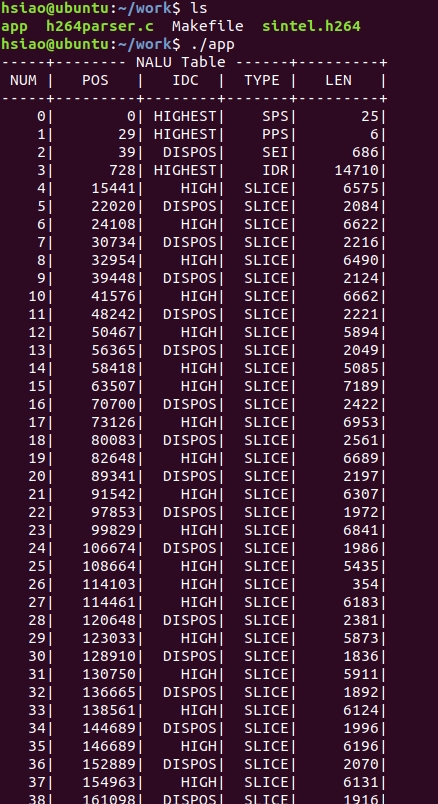阅读量:0
文章目录
声明:此篇示例源码非原创,原作者雷霄骅。雷霄骅,中国传媒大学通信与信息系统专业博士生,在此向雷霄骅雷神致敬。
代码原文地址:视音频数据处理入门:H.264视频码流解析
一、前言
示例源码是一个H.264码流解析程序。该程序可以从H.264码流中分析得到它的基本单元NALU,分离出NALU,然后再分析NALU的各个字段。
关于NALU的相关内容可参考文章【H.264】H.264详解(一)—— 一文看懂H.264协议
二、示例源码
【1】目录结构
project/ ├── Makefile ├── h264parser.c ├── sintel.h264 【2】Makefile源码
app:h264parser.c gcc -o app h264parser.c clean: rm -f app 【3】h264parser.c源码
#include <stdio.h> #include <stdlib.h> #include <string.h> typedef enum { NALU_TYPE_SLICE = 1, NALU_TYPE_DPA = 2, NALU_TYPE_DPB = 3, NALU_TYPE_DPC = 4, NALU_TYPE_IDR = 5, NALU_TYPE_SEI = 6, NALU_TYPE_SPS = 7, NALU_TYPE_PPS = 8, NALU_TYPE_AUD = 9, NALU_TYPE_EOSEQ = 10, NALU_TYPE_EOSTREAM = 11, NALU_TYPE_FILL = 12, } NaluType; typedef enum { NALU_PRIORITY_DISPOSABLE = 0, NALU_PRIRITY_LOW = 1, NALU_PRIORITY_HIGH = 2, NALU_PRIORITY_HIGHEST = 3 } NaluPriority; typedef struct{ int startcodeprefix_len; //! 4 for parameter sets and first slice in picture, 3 for everything else (suggested) unsigned len; //! Length of the NAL unit (Excluding the start code, which does not belong to the NALU) unsigned max_size; //! Nal Unit Buffer size int forbidden_bit; //! should be always FALSE int nal_reference_idc; //! NALU_PRIORITY_xxxx int nal_unit_type; //! NALU_TYPE_xxxx char *buf; //! contains the first byte followed by the EBSP } NALU_t; FILE *h264bitstream = NULL; //!< the bit stream file int info2=0, info3=0; static int FindStartCode2 (unsigned char *Buf){ if(Buf[0]!=0 || Buf[1]!=0 || Buf[2] !=1) return 0; //0x000001? else return 1; } static int FindStartCode3 (unsigned char *Buf){ if(Buf[0]!=0 || Buf[1]!=0 || Buf[2] !=0 || Buf[3] !=1) return 0;//0x00000001? else return 1; } int GetAnnexbNALU (NALU_t *nalu){ int pos = 0; int StartCodeFound, rewind; unsigned char *Buf; if ((Buf = (unsigned char*)calloc (nalu->max_size , sizeof(char))) == NULL) printf ("GetAnnexbNALU: Could not allocate Buf memory\n"); nalu->startcodeprefix_len=3; if (3 != fread (Buf, 1, 3, h264bitstream)){ free(Buf); return 0; } info2 = FindStartCode2 (Buf); if(info2 != 1) { if(1 != fread(Buf+3, 1, 1, h264bitstream)){ free(Buf); return 0; } info3 = FindStartCode3 (Buf); if (info3 != 1){ free(Buf); return -1; } else { pos = 4; nalu->startcodeprefix_len = 4; } } else{ nalu->startcodeprefix_len = 3; pos = 3; } StartCodeFound = 0; info2 = 0; info3 = 0; while (!StartCodeFound){ if (feof (h264bitstream)){ nalu->len = (pos-1)-nalu->startcodeprefix_len; memcpy (nalu->buf, &Buf[nalu->startcodeprefix_len], nalu->len); nalu->forbidden_bit = nalu->buf[0] & 0x80; //1 bit nalu->nal_reference_idc = nalu->buf[0] & 0x60; // 2 bit nalu->nal_unit_type = (nalu->buf[0]) & 0x1f;// 5 bit free(Buf); return pos-1; } Buf[pos++] = fgetc (h264bitstream); info3 = FindStartCode3(&Buf[pos-4]); if(info3 != 1) info2 = FindStartCode2(&Buf[pos-3]); StartCodeFound = (info2 == 1 || info3 == 1); } // Here, we have found another start code (and read length of startcode bytes more than we should // have. Hence, go back in the file rewind = (info3 == 1)? -4 : -3; if (0 != fseek (h264bitstream, rewind, SEEK_CUR)){ free(Buf); printf("GetAnnexbNALU: Cannot fseek in the bit stream file"); } // Here the Start code, the complete NALU, and the next start code is in the Buf. // The size of Buf is pos, pos+rewind are the number of bytes excluding the next // start code, and (pos+rewind)-startcodeprefix_len is the size of the NALU excluding the start code nalu->len = (pos+rewind)-nalu->startcodeprefix_len; memcpy (nalu->buf, &Buf[nalu->startcodeprefix_len], nalu->len);// nalu->forbidden_bit = nalu->buf[0] & 0x80; //1 bit nalu->nal_reference_idc = nalu->buf[0] & 0x60; // 2 bit nalu->nal_unit_type = (nalu->buf[0]) & 0x1f;// 5 bit free(Buf); return (pos+rewind); } /** * Analysis H.264 Bitstream * @param url Location of input H.264 bitstream file. */ int simplest_h264_parser(char *url){ NALU_t *n = NULL; int buffersize=100000; //FILE *myout=fopen("output_log.txt","wb+"); FILE *myout=stdout; h264bitstream=fopen(url, "rb+"); if (h264bitstream==NULL){ printf("Open file error\n"); return 0; } n = (NALU_t*)calloc (1, sizeof(NALU_t)); if (n == NULL){ printf("Alloc NALU Error\n"); return 0; } n->max_size=buffersize; n->buf = (char*)calloc (buffersize, sizeof(char)); if (n->buf == NULL){ free (n); printf ("AllocNALU: n->buf"); return 0; } int data_offset=0; int nal_num=0; printf("-----+-------- NALU Table ------+---------+\n"); printf(" NUM | POS | IDC | TYPE | LEN |\n"); printf("-----+---------+--------+-------+---------+\n"); while(!feof(h264bitstream)){ int data_lenth; data_lenth=GetAnnexbNALU(n); char type_str[20]={0}; switch(n->nal_unit_type){ case NALU_TYPE_SLICE:sprintf(type_str,"SLICE");break; case NALU_TYPE_DPA:sprintf(type_str,"DPA");break; case NALU_TYPE_DPB:sprintf(type_str,"DPB");break; case NALU_TYPE_DPC:sprintf(type_str,"DPC");break; case NALU_TYPE_IDR:sprintf(type_str,"IDR");break; case NALU_TYPE_SEI:sprintf(type_str,"SEI");break; case NALU_TYPE_SPS:sprintf(type_str,"SPS");break; case NALU_TYPE_PPS:sprintf(type_str,"PPS");break; case NALU_TYPE_AUD:sprintf(type_str,"AUD");break; case NALU_TYPE_EOSEQ:sprintf(type_str,"EOSEQ");break; case NALU_TYPE_EOSTREAM:sprintf(type_str,"EOSTREAM");break; case NALU_TYPE_FILL:sprintf(type_str,"FILL");break; } char idc_str[20]={0}; switch(n->nal_reference_idc>>5){ case NALU_PRIORITY_DISPOSABLE:sprintf(idc_str,"DISPOS");break; case NALU_PRIRITY_LOW:sprintf(idc_str,"LOW");break; case NALU_PRIORITY_HIGH:sprintf(idc_str,"HIGH");break; case NALU_PRIORITY_HIGHEST:sprintf(idc_str,"HIGHEST");break; } fprintf(myout,"%5d| %8d| %7s| %6s| %8d|\n",nal_num,data_offset,idc_str,type_str,n->len); data_offset=data_offset+data_lenth; nal_num++; } //Free if (n){ if (n->buf){ free(n->buf); n->buf=NULL; } free (n); } return 0; } int main(int argc, char* argv[]){ simplest_h264_parser("sintel.h264"); return 0; } 【4】编译运行

